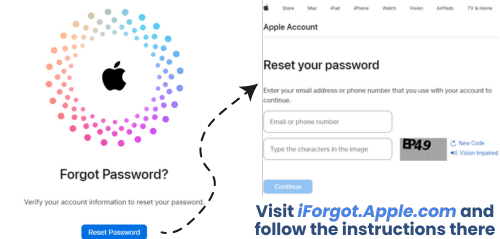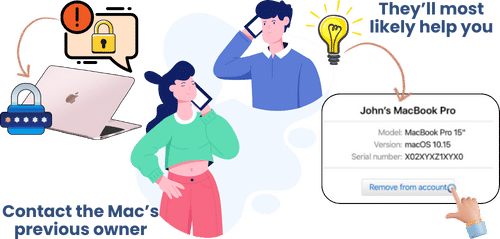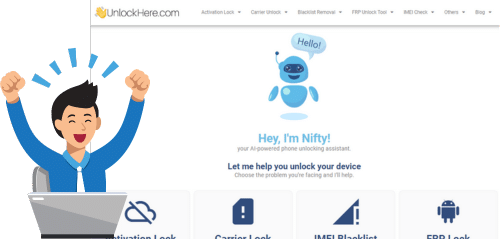Copyright UnlockHere 2025
Made with ❤ in Andorra

This Mac is linked to an Apple ID. Enter the Apple ID and password that were previously used with this Mac.
Explanation: This message appears when a Mac has Activation Lock enabled, typically as part of the Find My Mac feature. It prevents unauthorized access to the Mac by requiring the Apple ID and password of the original owner to unlock and use the device.
Being locked out of your MacBook can be a headache, especially if you have important information that you need to access. This often happens with old devices that you set up but forgot the password for, or when you simply set a random account and password to use it. Luckily for you, there are different ways to recover access to your Mac. In this guide, we will show you how to do so and the different things you need to be aware of for each method.

As Apple products, MacBooks, like the iPhone, contain certain security features that help keep them safe in case someone tries to reset them by force or if you have reported them as lost or stolen. If the iCloud lock is activated, your computer will be locked until your Apple ID and password are entered. This prevents unwanted individuals from accessing your information and also makes it harder to resell the MacBook, as it has no real use.
It is important to understand the differences between the iCloud lock and the password lock on your MacBook. The iCloud account is attached to your computer and helps manage things like location, storage, and, of course, enables the iCloud lock. On the other hand, the password lock is simply the password you have set for your user account to log in to your MacBook.
Be aware that both are very different and require distinct methods for unlocking. However, if you try to reset your password by force, your MacBook might interpret this as a security threat and enable the iCloud lock to prevent access. It assumes that an unknown user is attempting to break into your Mac without knowing the password.
If you are dealing with the password of your computer itself, there is a way to reset it using the FileVault recovery key, provided you set it up at some point. If you have this feature enabled, all you need to do is:
Now that you have identified that your MacBook is locked to iCloud, we need to determine which solution suits your needs best. Please make sure to read this guide carefully before trying any methods. This is crucial to ensure you don’t waste time or create further issues for your Mac.
The first and easiest thing to do is to remove your MacBook using another device linked to the same Apple ID, like your iPhone. This is a great tool that many people are not aware of and involves using your Apple ID to log your MacBook out of the account. This means that after resetting your MacBook, it will be free from the iCloud lock, and you can simply use it again. This solution is instant and, in most cases, will not require entering your Apple ID, as the other device is already logged in.


Another recommended way to do it is by creating a new password for your Apple ID. Fortunately, Apple Support might be able to help, but it will depend on how much information you currently have about the account. If you forget your password but have an active recovery number or email, your chances are higher. You can also contact or visit one of their branches to submit a request for a new password. This will require additional information, and it is up to Apple to decide whether to reset your login password for your Apple ID.
If you are not the main owner but have recently acquired a second-hand MacBook, there is a high chance the previous owner did not remove their account properly. However, this is not always intentional; sometimes, it happens due to a lack of knowledge. We advise contacting the previous owner and asking them to remove the device from their account. This process simply involves logging into their Apple ID and unlocking the MacBook by removing it from the synced devices.


If you have not been able to reset the password, you can try using third-party apps to help you gain access to your MacBook. Before trying any tool, make sure to research how it works, its reliability, and other important details. Avoid tools that require downloading software from unknown sources, and be cautious if they ask for excessive information. If you’re looking for a trusted solution, consider checking out UnlockHere’s professional unlocking service to get rid of this problem in minutes.
This option is not recommended because the activation lock was designed precisely to protect your Mac from unauthorized resets, but it might work on some devices. Try this only as a last resort, as it will erase all your data and carries a significant risk of making matters worse. If you choose to proceed, you will need to reset your MacBook to its factory settings using safe mode. However, we won’t go into detail, as this is not our preferred solution, and, as mentioned, it could potentially cause further issues.

If you want to unlock your MacBook Pro without the Apple ID or password, UnlockHere is here to help. Our AI-powered tool can help you reset your MacBook if you are currently stuck on the Apple ID and password screen. This process is 100% online and does not require the download of tools or any complicated steps.
The first step is to submit a request so Nifty can generate an unlocking request. Don’t worry, everything is done remotely, so no steps other than entering the following information are needed:
Make sure to enter this information correctly, as it will be crucial for unlocking your MacBook. Entering the information incorrectly will result in delays and require starting the process from scratch.
Once the request has been processed, you will receive an email and be redirected to your request or order page and will be asked to make a $2 payment, which is what this service costs. At this point, the unlocking process is almost complete. All you need to do is confirm your order using a third-party service that helps us verify your request is legitimate and ensure the system is not being abused. A video tutorial with easy-to-follow steps will guide you through this process, so don’t worry, it won’t take more than 5 minutes.
Once your request is generated and confirmed, you will receive a confirmation email notifying you that your MacBook has been unlocked. All that’s left to do is restart your MacBook. At this point, the message asking for the Apple ID and password will be gone, and you will be able to use your computer once again.

Yes, a MacBook Pro can be unlocked if the correct process is followed. This will depend on your specific situation. It might be as simple as resetting your Apple ID to regain access to your MacBook, or it could require more advanced solutions, such as using external tools like UnlockHere.
If you want to reset a MacBook without the Apple ID and password, you will need to use another device to remove it from the account. However, if you don’t have access to that, you can use a third-party app like Nifty by UnlockHere to help you resolve this issue.
Finding the Serial Number on your MacBook Pro can be done in two different ways. The first, and most obvious, is to check the product’s box; by law, it should be displayed there. If you don’t have the box with you, all you need to do is flip your MacBook, and on the back, you will find your serial number written somewhere along with other information.
Copyright UnlockHere 2025
Made with ❤ in Andorra